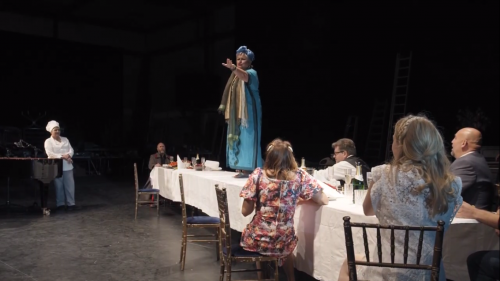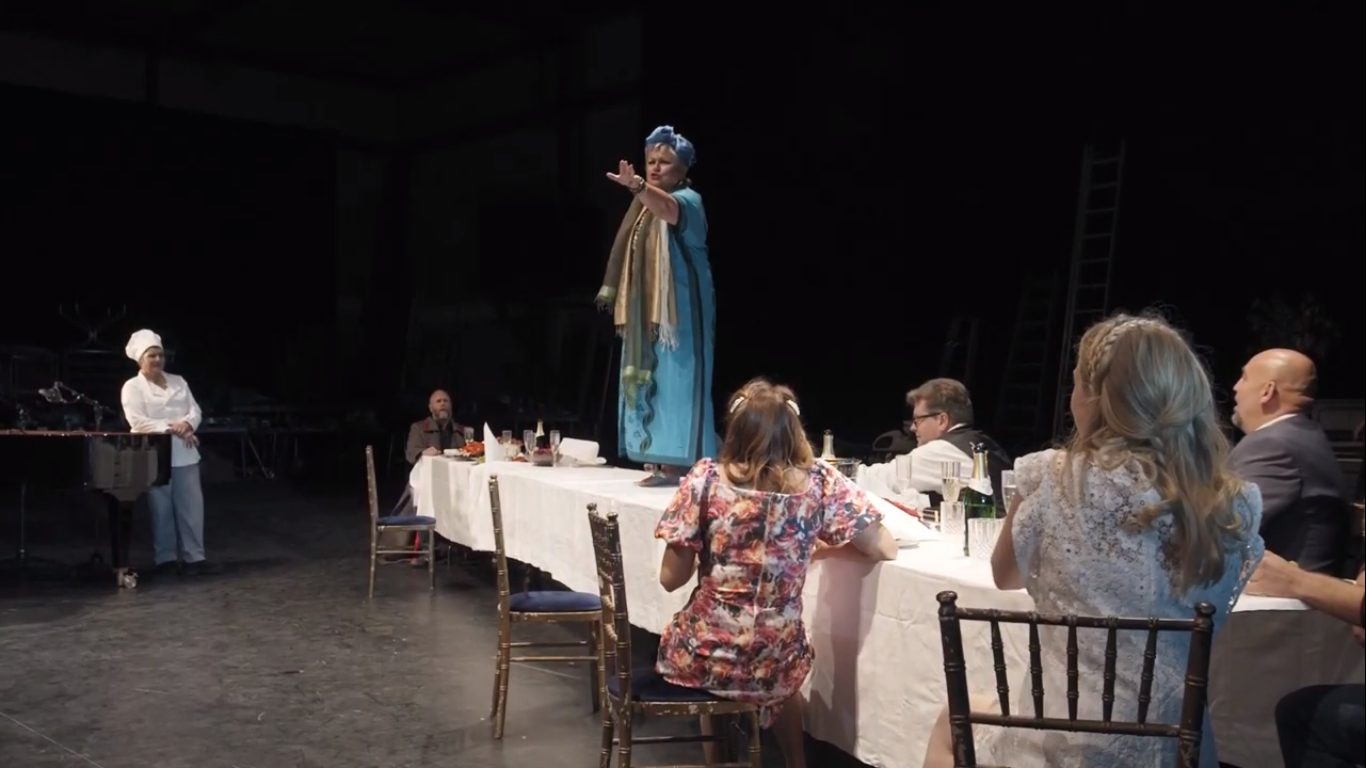 United Kingdom Grange Park Opera’s A Feast in the Time of Plague: Soloists, Alex Woolf (piano) / Toby Purser (conductor). Recorded 12-13.9.2020 and review on YouTube. (JPr)
United Kingdom Grange Park Opera’s A Feast in the Time of Plague: Soloists, Alex Woolf (piano) / Toby Purser (conductor). Recorded 12-13.9.2020 and review on YouTube. (JPr)

Production:
Libretto – Sir David Pountney (loosely based on Alexander Pushkin)
Music – Alex Woolf
Video Production – Fintan O’Connor
Sound – Tom Marshall
Cast:
Elena, a wealthy traveller – Claire Booth
Frederic, her butler – Peter Hoare
Joyce, the cook – Anne-Marie Owens
Lidochka, her daughter – Soraya Mafi
Claire, the clairvoyant – Susan Bullock
Antoine, a playboy – Simon Keenlyside
McGuire, a grandmother – Janis Kelly
Pius, an informer – Jeffrey Lloyd Roberts
Karl, a radical bohemian – Will Dazeley
Death / Policeman / Judas – Clive Bayley
Adina, newlywed to Pat – Sarah Minns
Pat, newlywed to Adina – Harry Thatcher
Grange Park Opera’s Interim Season is another quixotic affair and – as with their previous offerings during these sad times – you take their early announcements and dates with a (proverbial) pinch of salt! Anyway, it was interesting to finally see all of Sir David Pountney and Alex Woolf’s A Feast in the Time of Plague.
Pountney has explained his libretto as follows: ‘I responded to Pushkin’s little fragment by creating 12 – because of the Last Supper – very varied characters who arrive voluntarily and most of whom depart involuntarily – i.e. they die. In between they capture the defiance and solidarity that we have all experienced during these strange times. The virus exposes truths about all of us in surprising ways. A Feast in the Time of Plague captures this – as well as the essential lesson that we must carry on laughing.’ Pountney completed the libretto in early June and passed it to the 25-year-old composer, Alex Woolf, who completed his score in six weeks. It was performed at the Theatre in the Woods on 12/13 September. Apparently, performers and crew were tested for antibodies and Medical Detection Dogs provided dogs to help detect any trace of viruses.
It reminded me firstly of Amicus’s portmanteau films of the 1970s with titles such as Vault of Horror and From Beyond the Grave. Their films typically featured four or sometimes five short horror stories, linked by an overarching plot usually featuring a narrator and input from those listening to his story. More than anything my mind returned (again) to the mid-1970s and a 1972 TV movie called Haunts of the Very Rich which featured seven holidaymakers on a plane going to the mysterious ‘The Portals of Eden’. They all have a tale to tell and soon after they land things take a turn for the worse for them. It was wonderful to catch up with this film (immediately after watching this new opera) after 45 years courtesy of YouTube.
There are two parts: ‘Arrivals’ and ‘Departures’. Elena stops off at a restaurant (I guess?) and there is an early exchange between Elena and Joyce the cook. Cook: ‘We’re not really open, and no one has stopped here for some days. Too busy running away, but I guess the disease is faster than they are.’ Elena: ‘Exactly. That’s why I decided to stop. Had enough of running. Do you have any food?’. Cook: ‘That’s my job. Ma’am. Food I have. Customers I don’t.’ That is now the mantra of hostelries up and down England especially those in the ‘High’ or ‘Very High’ tiers!
Frederic her butler enters, and Elena tells him she wants a street party. Antoine arrives in a leather jacket and on his motorbike and gives them a hand. He proclaims how he seems to have escaped the disease so far but ended up the last man standing and set off on his bike ‘perhaps looking for a brick wall’. The elderly McGuire enters ‘I going to die and I want to celebrate’. On they come, thick and fast in a helter-skelter first half. A young couple enters, initially they seem much in love, but time will tell. McGuire confessed ‘I never learned to love, but eventually I learned to laugh, and I am laughing now.’ Frederic seems to be a defrocked priest and while he is reciting a prayer in Latin. Karl (described as ‘a bohemian’) arrives and proclaims ‘Aha, the fat cats saying their prayers! Feasting while the world is in ruins.’ Think of those paid to come up with a working track/test and trace system for the NHS or have shares in those creating a new vaccine.
Pius enters and is soon revealed to be a whistle-blower with a small camera. Claire enters and Antoine calls her ‘Madame Arcati’ and she sings ‘I went to the theatre a lot as a child. But I always knew how it would end. The others got very cross when I told them.’ (This is something that ‘plagues’ me as I can usually spot the guilty party in a murder mystery on TV the first time they appear!) There is a brindisi for all concerned lead by Elena and Antoine ‘Let’s drink till we cannot think that tomorrow we die’. A Policeman enters ‘This must stop at once! … This is an illegal assembly. Singing is illegal. Embracing is illegal’. Indeed, for all of us more than six is too many, singing spreads the virus in church, and you cannot hug anyone outside your immediate family or ‘bubble’. Elena entices Antoine upstairs and both sing ‘Let’s enter paradise’.
I am sure you get the idea now and during part two (spoiler alert!) they drop dead one by one apart from McGuire and Elena. Unseen Antoine is the first to go with a smile on his face I suspect! He is the only one who doesn’t get a final number. Claire sings a tour de force cabaret song about her prognostications from the beginning of the world to the present day. (I thought Susan Bullock was going to do the full ‘Dance of the Seven Veils’ but no, thankfully!) Black birds have long been considered messengers of death and Adina sees one before she dies. Lidochka hints she has suffered abuse before strangling herself with a black rope brought on by the Death character. Pius chokes on his dossier of ‘damning information’. Pat dies, Karl dies, Frederic dies, and Joyce suffocates in her own black blancmange. Elena remains to sing a funeral oration and puts black veils on the ‘departed’ party guests concluding ‘remembering good food, good friends, and mirth’. As in all those hoary old Amicus films Death reveals his hand before McGuire reappears and the ‘dead’ arise and together they join in a final triumphalist laughing chorus.
It would be good to see this again if A Feast in the Time of Plague gets a fully staged production at a future Grange Park Opera summer festival. In the wider opera world just think what Barrie Kosky would do with this material. Pountney did well staging his libretto in an ultimately captivating way; albeit with just a few dining tables, some chairs, and minimal props, and with a short – and possibly fraught – rehearsal period. Alex Woolf’s music is angular, yet accessible, quirky, yet characterful, and there was no one better in the circumstances to accompany the singers at the piano than the composer himself. Though it will be interesting to hear what a full(ish) orchestra do with the score.
The cast was mostly comprised of vastly experienced singer-actors, and it showed. Though overall Woolf’s vocal lines – particularly some of the high notes he demanded – were often of the voice-shredding kind. Its tessitura frequently took a toll on the singers’ ability to get their words over clearly. Susan Bullock could not fail to catch the eye(!) and ear with her long comic song; though it was no laughing matter when you consider her words ’I read in my old papyrus the dread coronavirus would rage until 2021’. Sadly, it looks as if it will be 2022 at the earliest now! Anne-Marie Owens relished her opportunities as the cook, as did Janis Kelly as McGuire, Will Dazeley as Karl, and Clive Bayley as Policeman, Death, as well as Judas (probably an empty seat, as here, at the first Last Supper). Everyone was totally committed, from veterans Sir Simon Keenlyside, Peter Hoare, and Jeffrey Lloyd Roberts to the younger voices of Soraya Mafi, Sarah Minns, and Harry Thatcher.
A considerable achievement for Grange Park Opera and I hope it get the audience on YouTube it deserves.
Jim Pritchard
For more about Grange Park Opera’s 2020 Interim Season click here.
